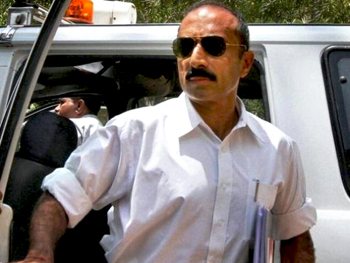New Delhi, Oct 13: The Supreme Court today dismissed the plea of sacked Gujarat cadre IPS officer Sanjiv Bhatt seeking a court-monitored SIT probe in relation to the two FIRs lodged against him for allegedly forcing his subordinate to file an affidavit in a 2002 riots case and hacking email of a law officer.

Bhatt, who had earlier sought a CBI inquiry into the two FIR, later changed his prayer and sought a court-monitored SIT probe on the ground that now the persons against whom he has certain grievances, are now running the government at Centre.
The former IPS officer had also sought impleadment of BJP president Amit Shah, the then MoS Home in the state government and RSS functionary S Gurumurthy as parties in his petition which was also rejected.
The IPS officer, dismissed from service on August 18 this year, had filed the petitions in the apex court in 2011 against the lodging of FIRs against him by the Gujarat Police.
On September 23, the apex court had reserved its verdict after Gujarat government had rubbished the claim of Bhatt that he was present at a meeting to discuss law and order situation during the 2002 communal violence at residence of the then Chief Minister.
Senior advocate Indira Jaising and lawyer Prashant Bhushan, appearing for Bhatt, had alleged collusion among top state government functionaries, the then Additional Advocate General, the then minister of state for home and some lawyers for the accused and sought court-monitored SIT probe into Bhatt's claims.
Jaising had argued that a SIT probe, instead of seeking CBI investigation, was needed to inquire into the "collusion of the highest order" as the then Chief Minister is now the Prime Minister and the then AAG is now the Additional Solicitor General of India.
Senior advocate L Nageshwar Rao, appearing for then Additional Advocate General Tushar Mehta, had alleged that Bhatt was trying to revive whatever happened since 2002.
Earlier, the counsel for Bhatt had also alleged that he was victimised and targeted by the state government, whose strategy was to shoot the messenger for his bold speaking on the handling of law and order situation during the 2002 riots.
One of the Bhatt's petitions pertains to an FIR lodged by Gujarat Police constable K D Panth in Ahmedabad alleging that Bhatt had pressurised him to sign an affidavit testifying that the IPS officer had participated in a high-level meeting after the Godhra carnage.
In another FIR, he has been accused of allegedly hacking then state's Additional Advocate General Tushar Mehta's e-mail account.
The apex court had earlier stayed criminal proceedings against the officer.
Bhatt in his plea had also sought fresh investigation against him in all cases with a plea for direction to Internet service providers to preserve all data he has put in the applications.





Comments
Add new comment